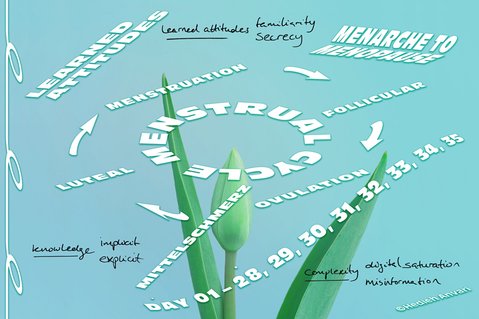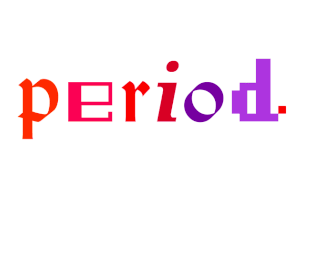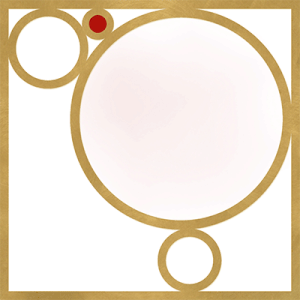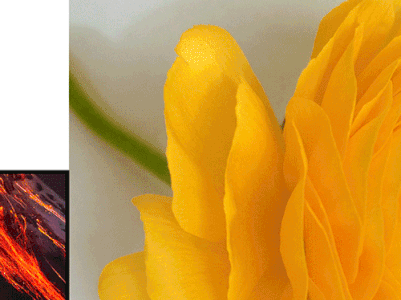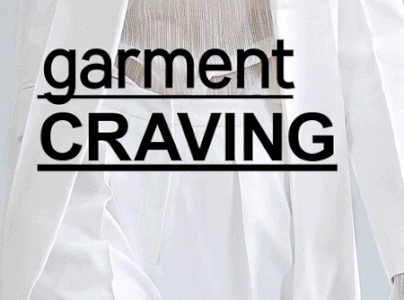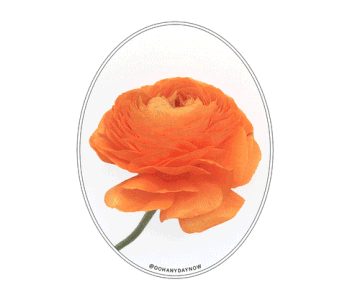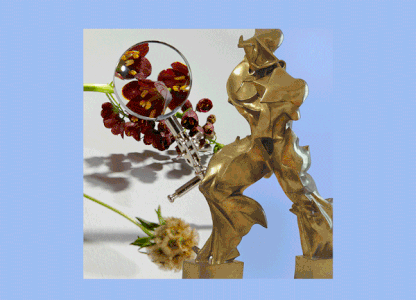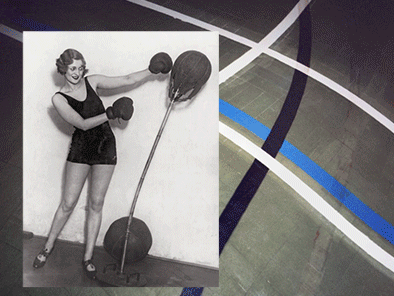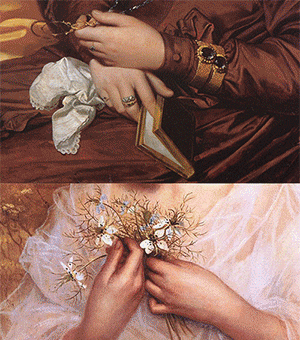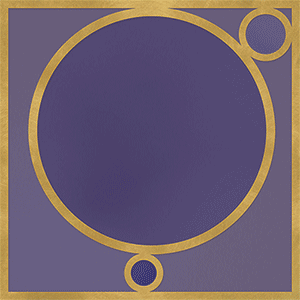Design thinking embedded in irreverent imagination. Crystallised by artistic direction. Powered by conceptual ideation – a creative practice by Hedieh Anvari; an admirer of the amorphous & its possibilities.
New Musing are in Development
The whys, the impetus and the justifications – an internal adjustment.
PERIODS: Acts Of Resilience and Strength
I have a strong conviction that we don’t need to worry about the future generation of young teens ever facing a lack of general knowledge on periods or be caught by surprise. This is partly thanks to today’s easy accessibility to online forums, recent growth in platforms dedicated to female health and other brilliant activities and groups.
I have though an unrelenting concern about how the topic is approached, even in support groups. Future generation of boys and girls would benefit if periods were viewed through a lens that is not shaded with outdated ideas and notions burdened by shame, taboo or stigma.
A less obscured lens would let us view the period as part of a bigger process that is there for a greater cause. It would let us recognise the importance of the menstrual cycle and its instrumental role in our emotional health and physical well-being. We would also be reassured that there’s no hidden agenda behind menstruation.
We would perhaps go as far as being awe-inspired by the meticulous doings of the ovaries that often happen with an impeccable time accuracy.
If we were to explain the menstrual cycle to a focus group compiled by aliens, with no preconceived ideas or prior exposure to media we would probably hear a different evaluation. They might say, it’s an expression of strength and resilience that is taking place in a woman’s body, month after month. They might refer to it as an ultra high-tech machinery which meticulously does its job while we go about our lives and if we are ever into procreating and making this planet move forward, the cycle gives us an opportunity to grasp.
In an age where slogans have taken over social media with messages encouraging the power of learning from past pains and difficulties and with the Education Secretary highlighting the importance of resilience to be taught at schools, we have periods as the zenith of perseverance and resilience.
So, it’s incredibly unhelpful or rather not advisable to be coy about this recurring endured pain, that is overcome and easily forgotten until the next round. I doubt Mother Nature is this coy about its abilities of tornadoes, freezing temperatures, blooms and blossoms and golden leaves.
But why are we failing to attribute the act of resilience with the successes of enduring and overcoming period pain?
Regardless of culture or geographic location, already at the early age of 9–12 girls are unwittingly learning and applying endurance, managerial and organisational skills through their periods, which are qualities to be immensely proud of. Unfortunately we repeatedly tell a different story, a story of inhibition in relation to girls and period. We echo terms such as period shame, taboo, and stigma – words that are truly jarring with this fascinating monthly spring.
Growing up with Iranian parents in Stockholm, there were clear differences in the approach of our household to my Swedish friends’. At home much fuss was made around the period and on what to eat and not eat or how to manage it all. A necessary know-how passed down, that tightly goes hand-in-hand with an underlying belief that if you look after yourself during your period you are investing in and ensuring a longer and easier fertility. There’s certainly no scientific proof or study on that but inevitably this notion makes the period a unique asset for each and every girl.
Knowledge is power and power is the fruit of self-esteem. There’s more to your and my period as they are only a fifth of the entire process. They may be the most visible and loud part of the cycle but we can get further in the process of empowerment by shifting our attention to a more 360-degree outlook and learn about the entire cycle, the different phases and how they benefit and affect our general well being.
Let’s not get bogged down with whether blue or red ink should be used in sanitary commercials. However, as a creative consultant, I would encourage use of golden liquid, only to be more in line with the preciousness and the grandeur of periods. Hedieh Anvar (originally written for HUFFPOST)
Blue or Red Ink
With all positive attention and focus on the beauty of bleeding, vibrant scarlet tones, flower shaped crimson artwork and beautifully blood stained knickers, it feels like an achievement that red ink gets the opportunity to be used in a sanitary commercial instead of the classic blue. Understandably it is also disappointing that the footage with red ink inside a pad had to be pixelated due to media restrictions.
I have really tried, but can’t help not to be moved by this great effort of representing blood in its true colour – in form of red ink. The emphasis on the importance of true hue representation of this bodily liquid is very much a good way to divert our attention from the rest of cycle and its functions.
It’s understandable that the visible 4 – 6 (roughly) days of the entire cycle are the days we remember most – certainly because of their overpowering nature. As the menstruation days are only a smaller part of the natural cycle, it would benefit and strengthen the dialogue, if the focus was on the entire cycle, its entity and its magnificent machinery. All the other things that happen quietly during the other 23 days of the cycle.
For a broader conversation around female health, body rhythm and in order to encourage the necessary sense of pride within girls and young women, it would help to let go of blood. Let go of blood stains and bloody knickers and see the entire 360 degrees circle.
With solid experience in menstruating, I still would be uncomfortable if I notice a blood stain on the back of my trousers. Less so, with an accidental wine or coffee stain on my blouse, but I would still feel a funny discomfort. Not a good look but accidents do happen.
I have a hunch that majority of period bearers don’t tend to indulge in ogling their menstrual blood. Personally, I have light haemophobia tendencies and can feel a bit light-headed and queasy as a result of an innocent nose bleed or a casual paper cut on my finger. In fact I remember in a couple of occasions as a teen where I blacked out for a few short seconds right after a simple blood test. Not because of the sudden increase in blood levels but just the mere sight of it. Hand on heart, I must admit that I prefer to not see my own blood and nor my blood stained knickers. Hedieh Anvari
Last Sunday
In fact it was three Sundays ago, to be precise. That’s how long it took me to be willing to share this experience.
Remembering it as a difficult Sunday which started in good spirit with a cosy long breakfast. Suddenly it switched and the more hours passed from that ‘feasty' breakfast the more it felt as there was no point and there were no lust and no appetite to do anything.
Everything, all of the sudden felt heavy, strenuous and more burdensome than ever. As I couldn’t really identify where the sudden mood change and hopelessness came from, I felt more and more guilty for being down and ungrateful and could only blame it on the swift autumn arrival and the cold air.
That’s how I passed the hours on that Sunday – by thinking, questioning and feeling bad about my mood. Nothing more sticks to mind from that day.
Monday morning came and I could feel it in my body – that hidden but shrewd pain, deep inside and around my ovaries. And there it happened, my period had arrived and lightness swept through me. It was as if fresh water had been poured over blazing fire. The instant bodily and mental relief is worth gold, reminding that it’s not my fault.
Interestingly this happens to me every second period cycle and each time it catches me off guard. This sense of belated insight unfortunately has taken too many years but luckily, I’m getting better at remembering that the draining hopeless feeling is directly linked to my period and it certainly isn’t the end of me. There’s hope and joy in my life!
Working on and hoping to be totally and utterly brilliant at remembering and recognising the symptoms, 'PMDD' and be on top of them.
'Premenstrual dysphoric disorder (PMDD) is a condition in which a woman has severe depression symptoms, irritability, and tension before menstruation. The symptoms of PMDD are more severe than those seen with premenstrual syndrome (PMS). ... In most cases, the symptoms stop when, or shortly after, her period begins.' Hedieh Anvari
Garment Craving
With a wardrobe happily filled with some of the latest seasons’ smartest designs hanging shoulder to shoulder with good decent vintage pieces bought in Italy and France, yet you sometimes may still repeatedly reach for a small fraction of your wardrobe and neglecting all the other beauties waiting to be acknowledged.
What is it that makes us, time after time returning to the same garment, among all the other carefully designed and crafted pieces obtained with hard earned capital?
Could it be how we last felt, wearing that garment – the occasion we last had it on and therefore the fond memories it brings us? Is just down to basic practicality and lack of time to think more innovatively and choose the garments from the back of the wardrobe?
What are we being motivated by? Are we after clothes to complement our mood? The subtle mood changes and a deep unconscious force rooted in the specific phase of the menstrual cycle you are at could have something to do with this particular ‘Garment Craving’.
These are the questions at the root of Garment Craving, as I truly believe there is more to our daily preferences than just being influenced by external imagery and fashion guidelines.
Every month, I find myself opting for white garments during my period. Initially unaware of it myself, it was pointed out to me years ago at high school in Sweden (gymnasiet) by a best friend. Certainly because it was the unwritten duty of each and one of us to warn each other of any visible stains. Oh how sweet it was, that warm and open sisterly support!
Still today after many moons of menstrual cycles, I catch myself wearing my brightest and most pale garments of clothing during my period – perhaps not the wisest colour choice.
I wonder why I’m drawn to white garments? When and how this unconscious choice come about, no matter the size of my wardrobe? Hedieh Anvari
Flower Female Anatomy
Continuing with my fascination for the machinery of the monthly cycle and flowers, I’ve been looking at the anatomy of flowers and re-learned the neglected school book knowledge, that flowers to some aspect share similarities with the female reproductive organs. They understandably have organs such as Ovules/eggs to that are produced in the ovary. On top of the ovary there is the tube called style and the very top the stigma which receives the pollen during fertilisation.
The Swedish Botanist Carolus Linnaeus/Carl Von Linné, introduced a sexual system called Systema Naturae in 1730. At the mere age of 23, he developed a new classification of the plant universe which until then had been a fairly chaotic affaire. After studying the sexual life of flowers he concluded that the stamens and pistils must be the most important characters for classifying the plants. He made direct comparisons with the human sexual organs and by discovering the varied reproductive parts in different plants he categorised them accordingly. Linné’s sexual classification wasn’t at first received well by the European botanist scientists but was soon the dominant system for it’s practicality.
The flower and female anatomy both have become one of my favourite fascinations and more flower stories and menstruation stories to come soon. Hedieh Anvari
Soft and Hard Power
There are those who are fascinated by the size of the universe and the vast number of galaxies beyond the solar system. Those who are excited by the idea and possibility of our life being in a parallel universe and who frequently marvel at the existence of human life, elsewhere than our planet.
There are equally those who avidly follow the derrière growth of certain LA sisters and like to believe no plastic surgery has ever been involved in the voluminous effects.
And there’s me – fascinated by the high tech machinery of the menstrual cycle and the persistent ovulation. The recurring cycle – month after month, like a quiet but painful merry-go-round in full action whilst we go about our lives.
In pain and in awe of the rather cute and conscientious manufacturing of my ovaries, I am reminded of the powerful sculpture ‘Unique Forms of Continuity in Space’ by Umberto Boccioni, 1913, and its expression of movement, fluidity and human strength.
I love dearly the quiet and minuscule monthly motion of my tiny little egg and the complex interplay of hormones and all the rest. Hedieh Anvari
The Big Flashy Gymnasium
She was the popular girl in the class and moreover the entire school. She wore trendy clothes, had a trendy unconventional haircut and knew her music very well. There was a certain tenderness to her self-confidence that didn’t make her intimidating and she happened to be my friend.
We became close friends within the first couple of months of the new school year in the new school; Högstadiet in Swedish, or High school. Her style very street and mine slightly quieter with an element of chicness.
We were in our mid teens and as the peak of our endearing naive arrogance. Just those few carefree years before a sea of life questioning thoughts and self doubt start emerging one’s brain.
The new school meant a new grand gymnasium for the sports lessons and much pride.
This particular souvenir of teen memory comes from moments just before another sports lesson. We were in a half empty dressing room as most of the girls had already left. We were just about to leave and head to the lesson as I caught a glimpse of this brilliant interaction which to this day symbolises and forms the basis of my overall thinking and disposition towards the monthly cycle and the period.
I remember very vividly the little scene with my friend seated on the floor, in front of two of the boys from our class - one which clearly and visibly fancied her and was in awe of her and a second who was too tough to admit. As I was walking towards them I saw her taking out a big sanitary pad (the very gigantic old fashion ones) from her bag as she gloriously was explaining to the boys what it was and how it worked. The boy who fancied her most was listening with fascination and with his eyes extremely oversized by the sight of the bright white sanitary pad. The tougher boy, leaning backwards was taking it all in with some composure.
And my friend, she was having an amazing time showing off and exhibiting her achieved womanhood and advancement in the biological evolvement. She was having a hell of a time! Hedieh Anvari
A First Time for Everything
There’s a first time for everything and mine was at the age of 14. Remembering it as the first and only time.
It was an upbeat spring day, after a long Scandinavian winter filled with contagious Friday afternoon optimism. I was a studious 14 year old girl and happy the school week had ended so I could head to the centre to see my mum at the bank, before some ‘bonding’ window shopping.
It is the little event at the bank that makes this extract of time a poignant and vivid fraction of memory for me.
A tall man at the counter who was speaking to a female bank staff stood out slightly from everyone else in his demeanour and not because of his height. He looked to be in his 30s to my back then teenage eyes and I clearly remember his loose cut black leather jacket that was on trend back then. He drew my attention and perhaps everyone else’s, as he was slightly louder than what you choose to be when you discuss your general bank errands.
People in the queue started to become subtly impatient as it turned out to be a lengthy enquiry. The female bank employee, who looked to be slightly older than him, by this time seemed more and more in a position of temporary authority and was rejecting his demands. Not knowing the exact details myself, only she knew whether she was uncooperative or genuinely unable to assist him.
And suddenly it came out – his loud outpour of “Har du mens eller?” in Swedish – “Are you on your period or something?” as he was leaving that counter and headed towards the exit. This certainly made everyone in the bank to wake up, while determinedly avoid any exchange of awkward eye contact.
I didn’t know what to make of it as I had never heard ‘Har du mens eller?’ and didn’t understand what it really meant or what the correlation could be, although by that time I had had period for almost three years.
Today, with a solid experience of a diverse range of period types; mild, non-mild and the traumatic kinds, it strikes me that the tall man clearly couldn’t think of any better way to soothe his disappointment but expressed his helplessness with these four Swedish words. “Har du mens eller?” “Are you on your period or something?”
Back at the bank in central Stockholm, my mother soon finished her errand and we strolled around for some window shopping and headed back home. I don’t recall asking my mum about the event with the tall man and was just happy the weekend had arrived.
That spring Friday evening started with a new discovery that I didn’t spend any energy to try to understand as it didn’t have much significance to me. Hedieh Anvari
Calling it ‘Ooh Any Day Now’
They are emotionally loaded – their existence certainly bring out mixed emotions. You are either anxiously waiting for it to arrive, only to release the bodily tension that has been mounting for the last couple of days. Or you may really badly want it to arrive as you don’t have any plans for parenthood as yet. You promise yourself to be more sensible in the future and beg to the higher powers to make it happen. Because you know that if it fails to arrive, your path will change temporarily or for a more (dramatic tone), everything will change for ever!
You are trying to become parents and the repeated monthly arrival is nothing but a frustrating disappointment – to say the least.
Either regular or irregular you most likely can sense the intensity in your body and know that it should be arriving any day now.
Other times, its unanticipated arrival can be just before that longed for beach holiday or that crisp white linen dress, planned to wear.
It is expected even when it’s not fully expected. It’s loved and loathed but never neglected. And its powerful presence ensures a myriad of emotions. Hedieh Anvari
